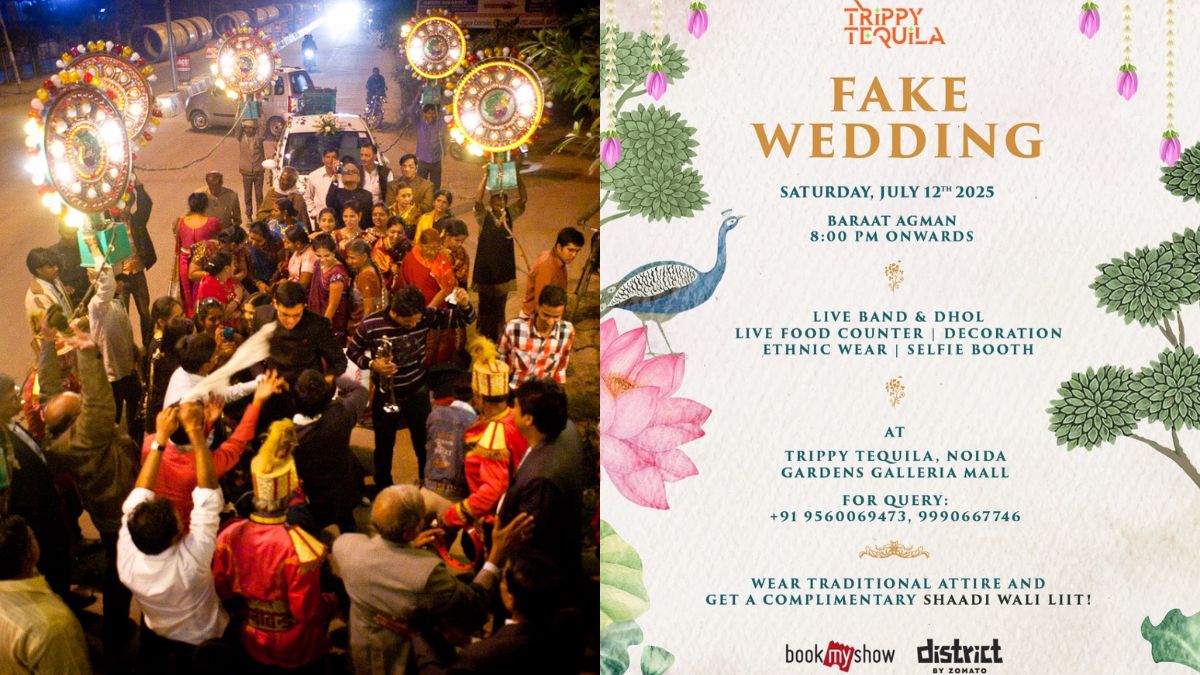Interestingly, Noida’s viral fake wedding event has taken social media by storm; moreover, it resonated instantly. Likewise, without any real dulha or dulhan, the crowd enjoyed dhol, dance, and dinner instead. Meanwhile, Gen Z attendees embraced the freedom; similarly, they loved celebrating without emotional or cultural wedding responsibilities. Furthermore, ticket prices started at ₹1,499; hence, people eagerly paid to enjoy unlimited food and festive entertainment. Additionally, event organizers designed the atmosphere perfectly; in fact, they created an authentic wedding vibe without any actual vows.
Notably, the venue showcased ethnic décor and loud dhol beats; therefore, it felt like a real wedding. Moreover, choreographed dance performances and mock Varmala moments added nostalgia; consequently, everyone captured perfect Instagram reels and selfies. Simultaneously, selfie booths and live band music elevated the experience; likewise, guests danced freely all evening. Furthermore, the concept quickly gained popularity across India; in particular, cities like Delhi, Bengaluru, and Pune followed suit. Likewise, young millennials appreciated the event’s carefree vibe; meanwhile, content creators flooded social media with reels and stories.

Interestingly, many called it a “Shaadi without drama”; similarly, others saw it as India’s quirkiest party trend. Additionally, ethnic fashion lovers used it as an opportunity to dress up and create stylish content. On the other hand, some critics questioned its value; however, supporters insisted it offered pure, guilt-free cultural joy. Moreover, the trend blended nostalgia with nightlife; thus, it created a new form of party entertainment. Besides, the rise of such experiential events shows today’s youth prefer memorable moments over formal traditions.
Simultaneously, Noida’s fake wedding concept removes awkward rishtedaar interactions; instead, it focuses on fun and celebration. In addition, themed cocktails like “Shaadi Waali Lit” entertained guests; therefore, the entire evening felt light-hearted and enjoyable. Meanwhile, the viral invitation shared by Aaraynsh on X sparked curiosity online; soon, netizens called it iconic. Furthermore, event managers and wedding planners began exploring this concept; hence, more such events may follow. Also, this shift indicates how urban party culture is evolving in India toward more personalized, creative experiences.
So why is it called a FAKE WEDDING? At its core, there’s no bride, no groom, and no actual marriage—just the full wedding atmosphere without the commitments. With vibrant decor, dhol, dinner, and even a mock Varmala, the event recreates the joy of a traditional celebration without the weight of rituals. Young attendees, mostly Gen Z and millennials, are showing up not for vows but for the vibe—seeking joy, social connection, and the perfect Instagram moment. These gatherings reflect a broader cultural shift where experience often matters more than convention. For many, it’s not about mocking weddings but about reimagining them to fit modern lifestyles. Whether this trend fades or grows, one thing is clear: India’s definition of celebration is changing, and mock weddings like the one in Noida prove the crowd is more than ready to dance, even if there’s no dulha or dulhan in sight.















































